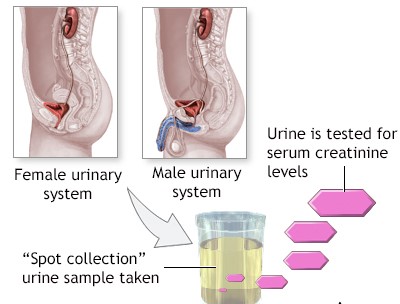A nurse is reviewing the laboratory reports of a client who is undergoing nutritional screening due to a risk for chronic kidney disease. The nurse should identify that which of the following results indicates the need for further assessment?
Serum creatinine 3.5 mg/dL
Hematocrit 45%
Blood urea nitrogen 18 mg/dL
Sodium 140 mEq/L
The Correct Answer is A
Choice A reason: Serum creatinine 3.5 mg/dL is high and indicates the need for further assessment. Creatinine is a waste product of muscle metabolism that is filtered by the kidneys. High creatinine levels can indicate kidney damage or impaired renal function.
Choice B reason: Hematocrit 45% is within the normal range (37-47% for women, 40-50% for men), and it does not indicate the need for further assessment. Hematocrit is the percentage of red blood cells in the blood. Low hematocrit levels can indicate anemia, bleeding, or hemolysis.
Choice C reason: Blood urea nitrogen 18 mg/dL is within the normal range (7-20), and it does not indicate the need for further assessment. Blood urea nitrogen is a waste product of protein metabolism that is filtered by the kidneys. High blood urea nitrogen levels can indicate dehydration, kidney damage, or high protein intake.
Choice D reason: Sodium 140 mEq/L is within the normal range (135-145), and it does not indicate the need for further assessment. Sodium is an electrolyte that helps maintain fluid balance, blood pressure, and nerve impulses. Low or high sodium levels can cause confusion, seizures, or coma.

Nursing Test Bank
Naxlex Comprehensive Predictor Exams
Related Questions
Correct Answer is C
Explanation
Choice A reason: Using liquids to clear food from the client's mouth is not a safe intervention for dysphagia. Liquids can easily enter the airway and cause aspiration, which is the inhalation of food or fluids into the lungs. Aspiration can lead to pneumonia, respiratory distress, and death.
Choice B reason: Tilting the client's head backwards to facilitate swallowing is not a safe intervention for dysphagia. This position can also increase the risk of aspiration, as it opens the airway and allows food or fluids to flow into it.
Choice C reason: Adding a thickening agent to liquids is a safe and effective intervention for dysphagia. Thickened liquids are easier to swallow and control, as they move more slowly through the mouth and throat. They also reduce the risk of aspiration, as they are less likely to enter the airway.
Choice D reason: Placing the client in a semi-Fowler's position is not a safe intervention for dysphagia. This position can also increase the risk of aspiration, as it lowers the head and neck and reduces the closure of the airway. A better position for dysphagia is upright or high-Fowler's, which elevates the head and neck and enhances the closure of the airway.
Correct Answer is B
Explanation
Choice A reason: Dietary restrictions will not eventually allow the intake of gluten to resume. Gluten is a protein found in wheat, barley, rye, and some oats. It causes damage to the small intestine in people with celiac disease. The only treatment for celiac disease is a lifelong gluten-free diet.
Choice B reason: This condition may cause secondary lactose intolerance. Lactose is a sugar found in milk and dairy products. It is broken down by an enzyme called lactase in the small intestine. People with celiac disease may have reduced levels of lactase due to the damage to the small intestine caused by gluten. This can lead to lactose intolerance, which is the inability to digest lactose properly. Symptoms of lactose intolerance include bloating, gas, diarrhea, and abdominal pain after consuming dairy products.
Choice C reason: Nutritional therapy for this condition does not include limiting proteins and calories. People with celiac disease need adequate amounts of proteins and calories to maintain their health and prevent malnutrition. They also need to ensure that they get enough vitamins, minerals, and fiber from gluten-free sources.
Choice D reason: A normal diet cannot resume after a period of remission. Celiac disease is a chronic autoimmune disorder that does not have a cure. Even if the symptoms improve or disappear, the damage to the small intestine can still occur if gluten is consumed. Therefore, a strict gluten-free diet must be followed for life.
Whether you are a student looking to ace your exams or a practicing nurse seeking to enhance your expertise , our nursing education contents will empower you with the confidence and competence to make a difference in the lives of patients and become a respected leader in the healthcare field.
Visit Naxlex, invest in your future and unlock endless possibilities with our unparalleled nursing education contents today
Report Wrong Answer on the Current Question
Do you disagree with the answer? If yes, what is your expected answer? Explain.
Kindly be descriptive with the issue you are facing.
